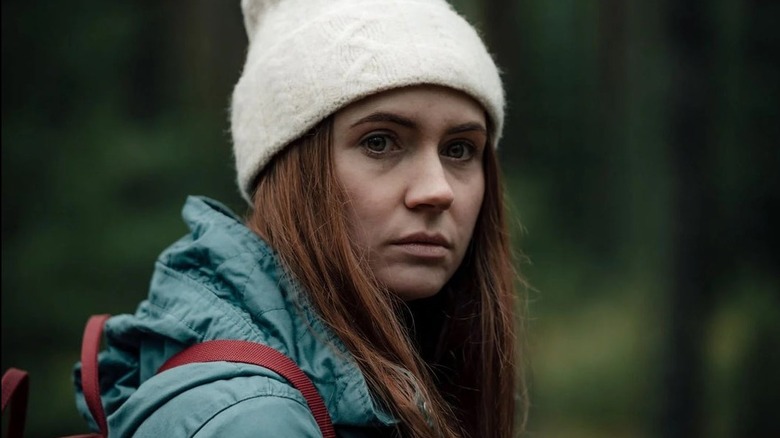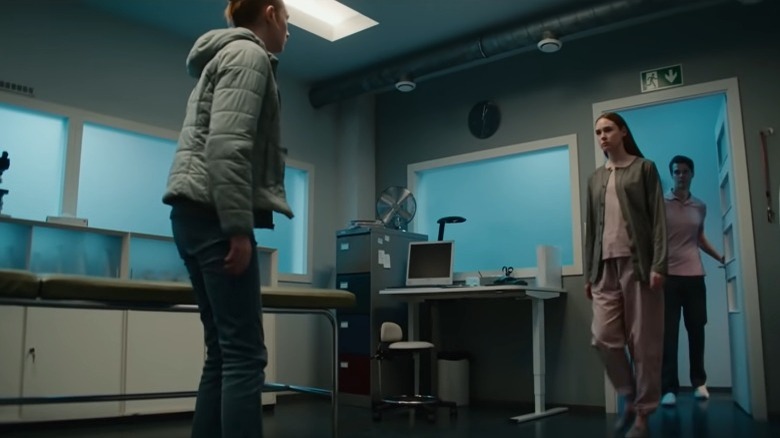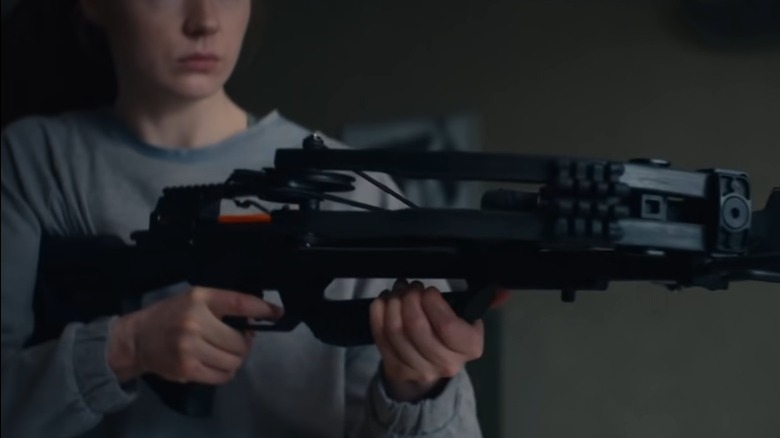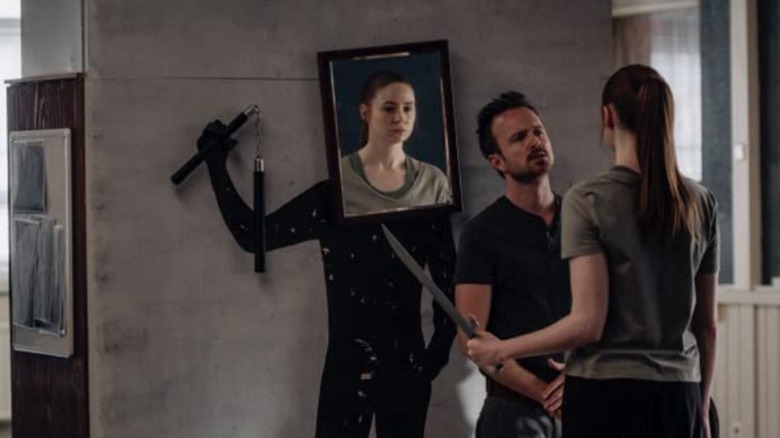Dual Star Karen Gillan On Playing Clones And Working On A Smaller Scale [Interview]
Karen Gillan is no stranger to blockbuster action, using her athleticism and gifted physical comedy chops to perfect effect in movies like the new "Jumanji" series or the "John Wick"-esque "Gunpowder Milkshake." As the angry, vulnerable assassin Nebula in the Marvel movies, she brought pathos and fear to the franchise, culminating in a time-travel showdown with her past self in 2019's "Avengers: Endgame." Now, for Riley Stearns' latest film, "Dual," she faces herself again, playing both a terminally ill woman and the clone made to help her family cope. But when the illness vanishes, the two versions of this character must duel to death.
/Film spoke with Gillan about the production of the film and the demands of playing multiple roles in the same movie.
Creating the clone
This isn't the first time you've acted against yourself on screen.
No.
I'm sure you get that a lot. What made it different from playing Nebula in the Marvel movies?
I've done it four times now, which is so interesting, because it's not the most normal thing. So each time I think I've learned a little bit more about how I like to do that. By the time it came to filming "Dual," I was like, "I know exactly how I would normally do this," and how important it is to me to have a really great actress to do this with [as a stand-in], because it is completely a team effort. And so I actually got to help choose the actress. I'm so grateful for her. She gave me a lot to react off of, which is the most important thing.
For the Nebula situation, that was fun, too. I love that scene, particularly because it got to show the old version and the current version of Nebula and that just really highlighted how incredible her arc has been emotionally and to literally see them opposite each other talking is really cool. And for "Dual," it was a lot more involved just because a lot of the movie is based on these two people.
You create these really recognizably different characters in "Dual," but you're not resorting to any obvious tics. You're not making one super slovenly or anything. It feels very subtle how you're creating these differences. So what went into developing both versions of Sarah?
Sarah, I just approached like every other character and the double, also every other character. I have my process that I go through to figure out who these people are. What was interesting with those two is, how do I differentiate between them? Because they're working with the exact same toolkit, but they've just had two different life experiences. For Sarah, she's been beaten down by life. She's low on confidence.
But the clone comes out and has experienced literally nothing. And so what does a version of a person look like that hasn't been beaten down by anything? No fear whatsoever, because they've never experienced anything. So that was really interesting to play around with. And then it was fun to evolve the characters. Sarah grew in confidence throughout the movie and the double gets more beaten down by life.
It made me think of an interview with Beulah Koale [who plays Sarah's partner in the movie]. He mentioned that part of why it was so easy for the character to move on and start a relationship with the new version of Sarah is because it probably reminded him of the day the romance first began.
That's interesting. Perhaps before Sarah lost her confidence and got beaten down by life.
Not going full deadpan
The emotional component of the movie is very understated, but also very potent. And I think about the conversations when Sarah first meets her clone, because it deals with a lot of really universal insecurities. How did it feel telling that story through those conversations?
It was just really interesting because she's looking at the same person, but just this better version, more confident, more in shape, an improvement on herself, which was really funny to play around with. And it was just fun because I imagine that Sarah's very conscious of taking up too much space and her double doesn't have any sense of personal space for other people — [she's] completely comfortable taking up all people's time and their space. So that was just like a fun contrast to play around with.
Were there any particular challenges with this blunt, deadpan dialogue?
For sure. When I first read the script, one of the most exciting aspects was this dialogue. Because I was like, "I don't know how to deliver this. And if I don't know how to do that, then that's something I should probably do so I can challenge myself." So then I studied Riley's movies and got the vibe of, there's a certain deadpan delivery to this. Yet with this movie, we didn't want to go full deadpan. We wanted to land somewhere in the middle. I remember just trying to figure out how to deliver it as if it was the most natural thing in the world. I really loved acting in that style. I had a really good time with it. I found it really funny.
I know when I've talked to people about the movie, it sounds comedic when you tell them what it's about. But it's bleak when you watch it. What drew you to the material?
I think it was one of the best scripts I'd read in ages. I think the style of writing was a huge aspect, because it's just so unique and it's not something you get to do every day. And then it was watching Riley's movies and going, "Oh, he's a completely interesting filmmaker with such a strong sense of identity and vision." And I want to be a part of that, because it's so exciting when the director knows exactly what they want from everybody involved. And it's so clear and we can all start to be this cog in a machine to bring this very specific vision to life. I love working like that. I knew that I was going to get that experience from working with him.
From blockbuster to indie
You've been in the Marvel movies, the "Jumanji" movies, "Gunpowder Milkshake," these high-energy action movies. And then you're moving from those characters to a character who's really very passive and keeps a lot of her pain from the surface. How did it feel building that character from what you've been working on recently?
Yes. Oh, that makes total sense. It definitely felt like a departure for me, because I have been doing a lot of these big blockbuster-style movies. But to me, it feels like the same process; whether I'm in a small indie or a juggernaut film, I still approach it the same way. And our job is still the same. When we hear action, we just have to deliver this somewhat truthfully and believably. So it doesn't feel that different. It was really fun to get to have maybe more time with the character to explore the emotions rather than like, "Oh no, we have a sequence where we're getting chased by these beasts." I have a little bit more time to get this character across to the audience. And I appreciated that.
How was it making the montage scenes, the training scenes?
Oh, that was so much fun. I remember doing the training scenes and then I was like, I spent so long perfecting my action hero run that I saw myself running. I was like, "Oh my God, Sarah can't run like this. She's never really worked out in her life." So I had to revert back to my original run and it didn't look as good, but it was fun to revisit that for a while.
The scenes with you and Aaron Paul are some of the funniest in the movie.
I loved filming those scenes so much. Working with Aaron was one of my favorite parts of this whole experience. He is such a wonderful person and hip hop dancing with him is going to be something I am laughing about when I'm an old lady.
What was some of the experience like filming with Covid protocols?
Oh my goodness. Filming during Covid is something that has become actually normal at this point, but we all felt incredibly lucky to be able to make a film during those times. It was a lot of Covid testing. We were getting tested multiple times a week. We had to really make sure that we didn't go out and socialize with people or put ourselves in situations where we might get it. And then also, you just never see the bottom half of anyone's faces. You're always surprised by the bottom of their faces. Because you're like, "That's not what I was imagining this whole time."
"Dual" arrives in theaters on April 15, 2022.



